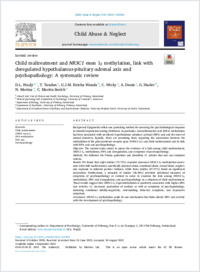Child maltreatment and NR3C1 exon 1F methylation, link with deregulated hypothalamus-pituitary-adrenal axis and psychopathology: A systematic review
DOKPE
- Wadji, D.L. University of Fribourg
- Tandon, T. University of Fribourg
- Ketcha Wanda, G.J.M. University of Yaoundé I, Cameroon
- Wicky, C. ORCID University of Fribourg
- Dentz, A. University of Fribourg
- Hasler, G. ORCID University of Fribourg
- Morina, N. University of Zurich, Switzerland
- Martin-Soelch, C. University of Fribourg
- 2021
Published in:
- Child Abuse & Neglect. - Amsterdam : Elsevier BV. - 2021, vol. 122, p. 1-11
English
Background: Epigenetics offers one promising method for assessing the psychobiological response to stressful experiences during childhood. In particular, deoxyribonucleic acid (DNA) methylation has been associated with an altered hypothalamus–pituitary–adrenal (HPA) axis and the onset of mental disorders. Equally, there are promising leads regarding the association between the methylation of the glucocorticoid receptor gene (NR3C1-1F) and child maltreatment and its link with HPA axis and psychopathology.
Objective: The current study aimed to assess the evidence of a link among child maltreatment, NR3C1-1F methylation, HPA axis deregulation, and symptoms of psychopathology.
Methods: We followed the Prisma guidelines and identified 11 articles that met our inclusion criteria.
Results: We found that eight studies (72.72%) reported increased NR3C1-1F methylation associated with child maltreatment, specifically physical abuse, emotional abuse, sexual abuse, neglect, and exposure to intimate partner violence, while three studies (27.27%) found no significant association. Furthermore, a minority of studies (36.36%) provided additional measures of symptoms of psychopathology or cortisol in order to examine the link among NR3C1-1F methylation, HPA axis deregulation, and psychopathology in a situation of child maltreatment. These results suggest that NR3C1-1F hypermethylation is positively associated with higher HPA axis activity, i.e. increased production of cortisol, as well as symptoms of psychopathology, including emotional lability-negativity, externalizing behavior symptoms, and depressive symptoms.
Conclusion: NR3C1-1F methylation could be one mechanism that links altered HPA axis activity with the development of psychopathology.
Objective: The current study aimed to assess the evidence of a link among child maltreatment, NR3C1-1F methylation, HPA axis deregulation, and symptoms of psychopathology.
Methods: We followed the Prisma guidelines and identified 11 articles that met our inclusion criteria.
Results: We found that eight studies (72.72%) reported increased NR3C1-1F methylation associated with child maltreatment, specifically physical abuse, emotional abuse, sexual abuse, neglect, and exposure to intimate partner violence, while three studies (27.27%) found no significant association. Furthermore, a minority of studies (36.36%) provided additional measures of symptoms of psychopathology or cortisol in order to examine the link among NR3C1-1F methylation, HPA axis deregulation, and psychopathology in a situation of child maltreatment. These results suggest that NR3C1-1F hypermethylation is positively associated with higher HPA axis activity, i.e. increased production of cortisol, as well as symptoms of psychopathology, including emotional lability-negativity, externalizing behavior symptoms, and depressive symptoms.
Conclusion: NR3C1-1F methylation could be one mechanism that links altered HPA axis activity with the development of psychopathology.
- Faculty
- Faculté des sciences et de médecine
- Department
- Master en médecine
- Language
-
- English
- Classification
- Pathology, clinical medicine
- License
- Open access status
- gold
- Identifiers
-
- DOI 10.1016/j.chiabu.2021.105304
- ISSN 0145-2134
- Persistent URL
- https://folia.unifr.ch/unifr/documents/327416
Statistics
Document views: 95
File downloads:
- wadjietal.2021: 204
